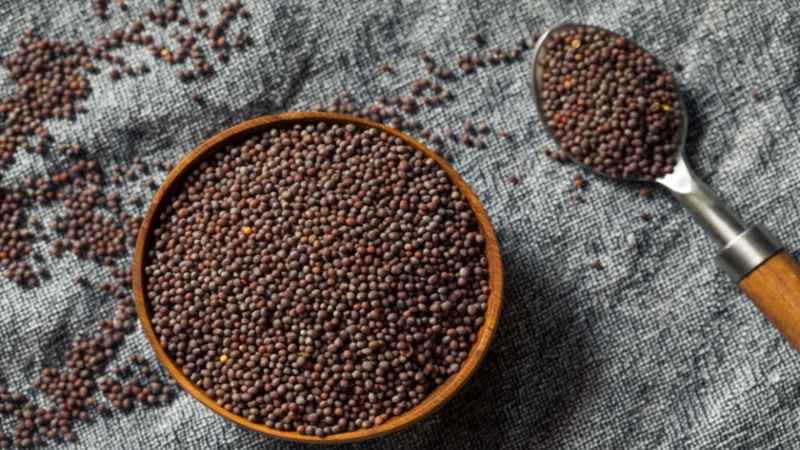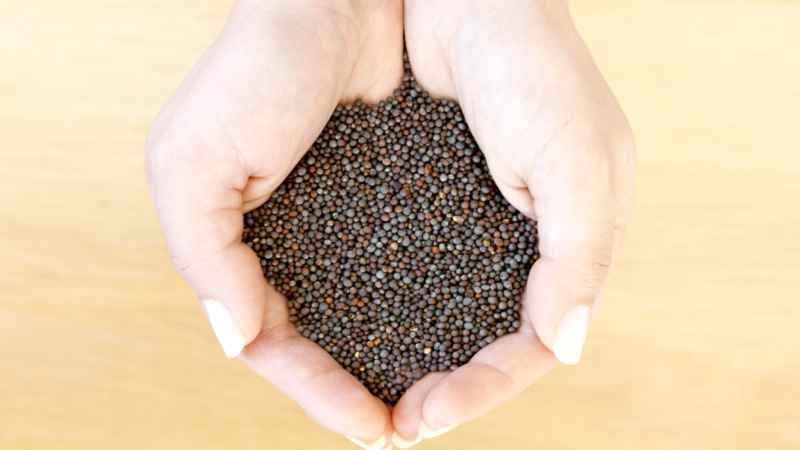
From ancient times, Indian people are consuming mustard seeds in their regular diets, whether in the form of seeds, oils, paste or sauces, and many more. Why are these seeds so popular among people? Do they have any specialty? Yes, They are a rich source of a lot of nutrients. Not only do they possess multiple health benefits but they add beautiful aroma and flavor to the food. It makes them more special and popular among people.
Is there any limit to consume black mustard seeds? Are they safe to consume during pregnancy? Well, as they are the powerhouse of nutrients so many questions may arise in your mind related to them. Today, we will get to know more in detail about mustard seeds with scientifically proven facts.
What are Black Mustard Seeds?

Mustard plants are grown abundantly in various parts of India. We use it as seeds or in the form of oils or condiments. Not only it has good aromas and taste but It also has amazing therapeutic properties because of which Ayurveda recommends it as medicine (1). It is available in different varieties all over the country.
Black mustard seeds are small and dark colored. These seeds have a strong, pungent, and bitter taste. That is why people mix it with ingredients like vinegar, lemon juice or salts to make a paste or sauce to consume it. Mustard seeds are a very good source of protein, minerals, antioxidants and vitamins. It has multiple health benefits like anti-bacterial, anti-fungal, and anti-diabetic. (2)
Is It Safe To Consume Mustard Seed During Pregnancy?

Yes, it is completely safe to consume black mustard seeds during pregnancy as a part of a complete meal. According to UNICEF, one of the cooking oils pregnant woman should prefer during cooking their meals is mustard seed oil(3). These seeds are packed with nutrients and high amounts of bioactive compounds so, they must be consumed in moderation. If it is consumed in large amounts without any prescription or under no supervision, it may harm pregnant women’s health, sometimes, even may lead to miscarriage. These seeds are not advised to be consumed in huge amounts during pregnancy. So be cautious about the amount you consume.
[Read: Ajwain During Pregnancy]
Top 5 Benefits of Consuming Black Mustard Seeds in Pregnancy

Mustard seeds are a good source of oil and protein. They are also packed with health-beneficial compounds that can positively impact a pregnant woman’s health.
Mustard seeds are rich in fiber, healthy fats, proteins, vitamin A, calcium, iron, potassium, magnesium, and Foliate content (4). Here are some benefits of black mustard seeds:
1. Good for Heart Health
Mustard seeds contain healthy fats which lowers the bad cholesterol in the body and improve heart health of both the mother and the fetus. Also, it is a source of fiber which helps lower cholesterol and protects the heart. The antioxidants present in the seeds help in reducing the bad cholesterol and inflammation in the body.
2. Good for Diabetes
Black mustard seeds contain an abundance of bioactive compounds, which may have an anti-diabetic effect and help maintain blood glucose levels during pregnancy.
3. Protects from Chronic Diseases
Mustard seeds are a rich source of vitamin A, B-complex vitamins, fiber, phytonutrients, and antioxidants which help in reducing the negative effects in the body and improve overall health. As studies show it is also good for reducing pain during pregnancy. Mustard seeds also help to lower anxiety and help maintain cholesterol and treating sleep-related issues and brain problems.
4. Inhibits Cancer Cell Production
The bioactive compounds and antioxidants present in the seeds hinder the promotion of cancer cells and protect the body from the risk of developing cancer.
5. Pain Reliever
The glucosinolates present in the mustard seeds help in reducing pain in the body (5). During pregnancy back aches and swollen legs are very common sights and thus consumption of mustard seeds helps to keep pain at bay.
[Read: Cardamom During Pregnancy]
Side Effects Of Having Black Mustard During Pregnancy

No, there are no side effects of consuming black mustard seeds in moderate amounts during pregnancy. People have been consuming mustard seeds for a long time due to their flavor and aromatic nature. It is safe to consume mustard seeds in diluted forms or small amounts like cooking oil, or in tadka while cooking. However, Consuming mustard seeds in large quantities may harm the expectant mother and her baby. (6)
- It may irritate the respiratory tract and can block it if it is taken in a huge amount in raw form. People suffering from lung problems should consume it under the supervision of a physician.
- Mustard seed or oil may contain some allergens which may cause skin rashes, itching, and redness on the skin.
- Consumption of mustard seeds in large quantities may irritate your gut health causing upset stomach, vomiting, and diarrhea.
Precautions to Take While Having Black Mustard During Pregnancy
When a woman is expecting a baby, she needs to be extra cautious of what she is eating in her diet. While using any ingredient, moderation is the key. Anything consumed in large doses may harm the expectant mother’s health as well as the baby’s health. A small amount of mustard consumed as oil or seeds is good but a large quantity in concentrated or isolated form must be avoided. A pregnant woman should consult a doctor or dietitian before consumption.
Who Should Not Have Black Mustard Seeds While Pregnancy?

A small amount of black mustard seeds give a beneficial effect when used in diets. However, due to the presence of high amount of bioactive compounds, it is not used under the following conditions:
- If the pregnant woman is asthmatic, she should consume mustard seeds under the supervision of a doctor.
- One who is already suffering from skin rashes or allergies should avoid consuming heavy doses of concentrated mustard seeds.
- When the pregnant woman is feeling acidic or has any digestive issues, avoid black mustard seeds as they may worsen the situation.
- If you are taking any medicine that may interact with the compounds present in black mustard seeds, it is advised to consult your doctor.
Black mustard seeds are part of every household due to their special aroma and flavor. These seeds are the powerhouse of many nutrients and bioactive compounds. It provides many health benefits when consumed in small quantities whether in the form of seeds, edible oil or sauce, etc. It is good to consume during pregnancy as it adds good nutritional value to the food. But always remember that it is packed with high amounts of bioactive compounds which means if consumed in higher amounts or concentrated form may produce harmful effects on the body. So, you can always use it in moderation to add flavors, aroma, and additional nutrients to your diet.
Read Also: Black Salt During Pregnancy
FAQ’s
1. Are Mustard Seeds High In Iron?
Yes, Mustard seeds are a good source of iron. According to USDA, grounded mustard seeds fulfill 51.2% of our daily iron.
2. Are Mustard Seeds Beneficial For Early Pregnancy?
Yes, Mustard seeds are good to consume during pregnancy. But Always consume it in moderate amounts.
3. Can a Pregnant Woman Eat Sarso Ka Saag?
Mustard leaves are rich in folate and can be essential for good fetal development.
References
- M.M. Abul -Fadl, N.El-Badry and M.S Ammar Nutritional and Chemical evaluation for Two different varieties of mustard seeds. World Applied Sciences Journal 15 (9) : 1225-1233, 2011 –https://www.researchgate.net/profile/Mostafa-Aboulfadl/publication/279597329_
- Mamta sahu, suman devi, Pragya Mishra and ena gupta Mustard is a miracle seed to Human Health DOI: 10.4018/978-1-7998-2524-1.ch012 – https://www.igi-global.com/chapter/mustard-is-a-miracle-seed-to-human-health/252455
- UNICEF , What to eat before, during and after pregnancy – https://www.unicef.org/rosa/stories/what-eat-during-and-after-pregnancy
- Raikwar, Rudrasen. (2019). Rapeseed and Mustardf 978-3-659-91833-9 – https://www.researchgate.net/figure/Nutritional-value-100-g-of-mustard-seed_tbl1_333207502
- Gitishrii das et al (2022) Glucosinolates and Omega-3 Fatty Acids from Mustard Seeds: Phytochemistry and Pharmacology Plants National Library of Medicine https://www.ncbi.nlm.nih.gov/pmc/articles/PMC9459965/
- Lietzow J. Biologically Active Compounds in Mustard Seeds: A Toxicological Perspective. Foods. 2021 Sep 3;10(9):2089 – https://www.ncbi.nlm.nih.gov/pmc/articles/PMC8472142/

